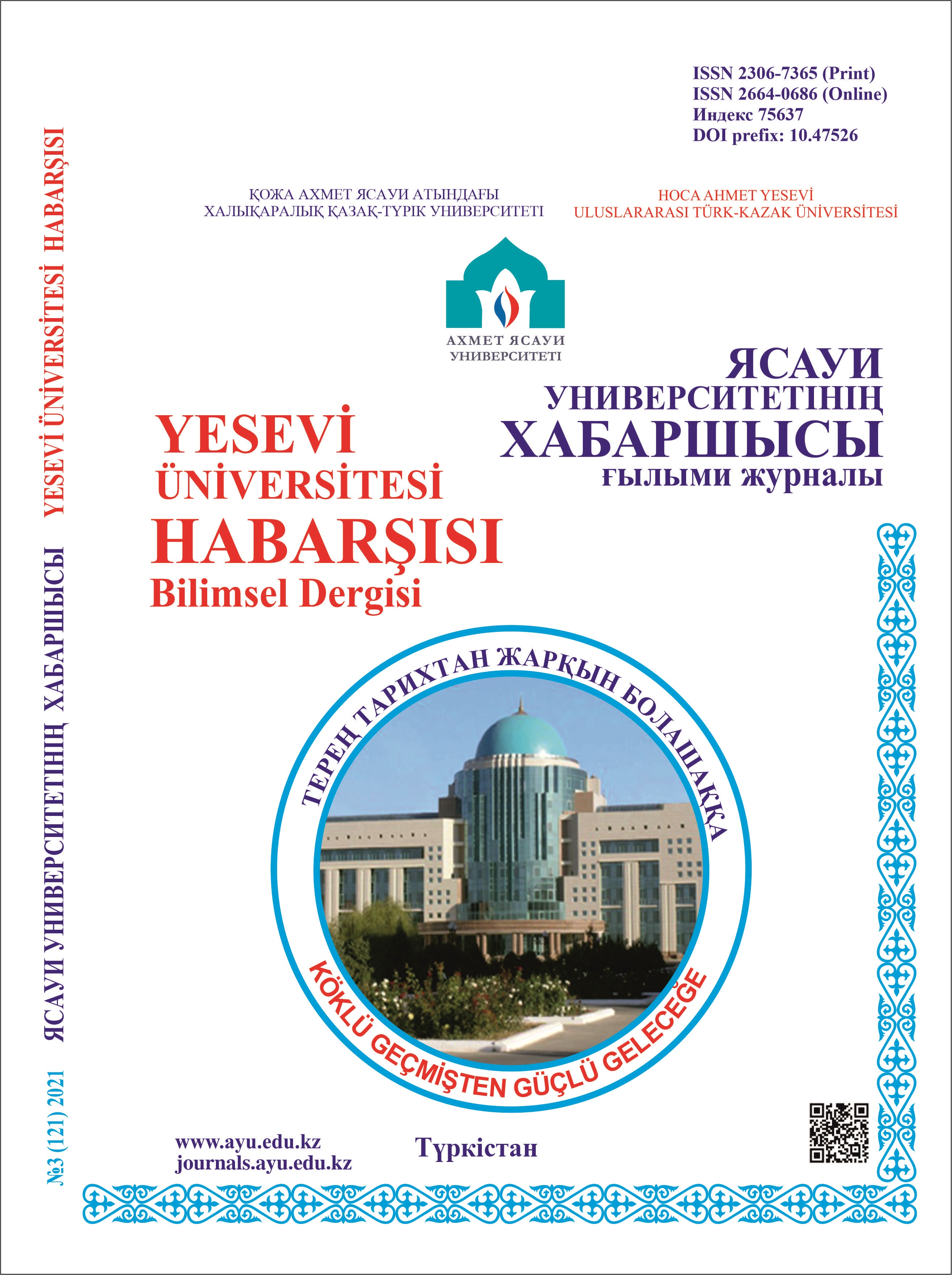АХМЕТ БАЙТҰРСЫНОВТЫҢ ӘДЕБИЕТТАНУ САЛАСЫНДАҒЫ ЕҢБЕКТЕРІНІҢ ТЕОРИЯЛЫҚ НЕГІЗДЕРІ
219 90
Кілт сөздер:
теория, әдебиеттану, антропология, психология, пән, мәтін.Аңдатпа
XX ғасырдың басында қазақ ғылымының көш басында болған А. Байтұрсыновтың әдебиеттану саласындағы еңбегі сол тұстағы Еуропа және Ресей ғалымдарының антропологиялық, психоаналитикалық және көркемдік-эстетикалық тұғырнамаларымен сабақтасып жатыр. Кеңістік идеология үстемдік құрмай тұрып жарыққа шығып үлгерген «Әдебиет танытқыш» кітабының теориялық негіздемелерінің түп төркініне зер салар болсақ, онда сөз еркіндігі, ойлаудың әдіске, ағымға, белгілі бір көзқарас жүйесіне байланып қалмай, болмысты объективті түрде бейнелеуге қарай ұмтылыс жасау керектігін тұтастай пайымдаған. Ғалымның Еуропа және Ресей әдебиеттану ғылымында басымдыққа ие болып, қанат жайып келе жатқан ізденістердің шығармашылық еркіндікке қарай ұмтылысын дөп басқаны байқалады. Ізденістің кейде нәтижесіз аяқталған тәжірибесін де талдай отырып, одан қазақ әдебиетін сақтандырады. XX ғасырдың басында орын алған формализм мектебінің бір жақты форма қуалап, жасанды сөз жасаумен әуестенген әрекетін сынға алады. Бұл ретте Абай поэзиясын жасандылық атаулыдан аулақ, шынайы шығармашылықтың үлгісі ретінде алға тартады. Абайдың сөзді алаламай, барын бардай шындыққа және көркемдікке қызмет ететін сөз қолданысын шебер пайдаланғандығын тұғырнамалық ұстанымға айналдырады. Ғалымның позициясы бойынша сөздерді сұрыптап бөлмеу және талдау үшін мәтін тұтастығына мән беру – шығарманың табиғатын шынайы тануға, сол арқылы жазушының көзқарасы мен психологиясына, суреткерлік болмысына жақындауға мүмкіндік беретін жол екенін негіздейді.
Түркология ғылымының тарихында «Радлов кезеңі» аталып жүрген XIX ғ. соңы мен XX ғ. басындағы еуропалық және ресейлік антропологиялық бағыттағы ізденістермен сабақтасып жатқан А. Байтұрсыновтың зерттеулері қазақ әдебиеттануын сол дәуірдегі озық ғылыми тәжірибеге қарай бағыттағаны анық. Көркемдік ізденісте де, әдебиеттану ғылымының даму жолында да еуропалық тәжірибеге қарай ұмтылыстың маңыздылығын атап көрсеткеніне қарағанда, бұл жол тәуелсіз елдің әдебиетінің қалай болуы керектігімен бірлікте пайымдалғанын көрсетеді.
Әдебиеттер тізімі
ПАЙДАЛАНЫЛҒАН ӘДЕБИЕТТЕР ТІЗІМІ
Насилов Д.М. Российская тюркология наших дней // Российская тюркология. – 2009. – №1. – С. 3–7.
Богданов К. Повседневность и мифология: исследование по семиотике фольклорной действительности. – СПб.: Азбука, –Азбука-Аттикус, 2015. – 416 с.
Ибраев Ш. Түркология: ғылыми парадигмасы және пәнаралық сипаты // Turkic Studies Journal. – 2019. – №2. Vol. 1. – Б. 41–51.
Чагин А.И. Литература. Конец 19 века – начало 20 века // Большая российская энциклопедия. – М.: Большая Российская энциклопедия, 2004.
Байтұрсынұлы А. Шығармаларының академиялық толық жинағы. Бестомдық. 2-том / Томды құрастырып, баспаға дайындағандар: Матыжанов К., Ісмахова А., Рақыш Ж., Мұстафаева К., Ахмет Ә. – Астана: Smart University Press, 2023. – 876 б.
Брокмейер Й., Харре Р. Нарратив: проблемы и общения одной альтернативной парадигмы // Филологические науки. – 2000. – №3. – С. 29–42
Лэнгле Альфрид. Основы экзистенциального анализа. – СПб.: Питер, 2022. – 288 с.
Хроленко А.Т. Основы современной филологии. – М.: ФЛИНТА: Наука, 2013. – 352 с.
Смулянский А.Е. Исчезающая теория. Книга о ключевых фигурах континентальной философии. – М.: РИПОЛ классик, 2021. – 496 с.
Философия и филология. Круглый стол // Новое литературное обозрение. – 1996. – №17. – С. 45–93.
Лукин В.А. Художественный текст. Основы лингвистической теории. Аналитический минимум. 2-е изд., перераб. и доп. – М.: Ось – 89, 2005. – 559 с.
REFERENCES
Nasilov D.M. Rossiyskaia tiurkologia nashih dnei [Russian Turkology of our days] // Rossiyskaia tiurkologia. – 2009. – №1. – S. 3–7. [in Russian]
Bogdanov K. Povsednevnost i mifologia: issledovanie po semiotike folklornoi deistvitelnosti [Everyday life and mythology: Studies on the semiotics of folklore reality]. – SPb.: Azbuka, –Azbuka-Attikus, 2015. – 416 s. [in Russian]
Ibraev Sh. Turkologia: gylymy paradigmasi jane panaralyq sipaty [Turkology: scientific paradigm and interdisciplinary nature] // Turkic Studies Journal. – 2019. – №2. Vol. 1. – Б. 41–51. [in Kazakh]
Chagin A.I. Literatura. Konec 19 veka – nachalo 20 veka [Literature. Late 19th century – early 20th century] // Bolshaia rossiyskaia enciklopedia. – M.: Bolshaia Rossiyskaia enciklopedia, 2004. [in Russian]
Baitursynuly A. Shygarmalarynyn akademialyq tolyq jinagy. Bestomdyq 2-tom [A complete academic collection of his works. In five volumes. Volume 2] / Tomdy qurastyryp, baspaga daiyndagandar: Matyjanov K., Ismahova A., Raqysh J., Mustafaeva K., Ahmet A. – Astana: Smart University Press, 2023. – 876 b. [in Kazakh]
Brokmeier Y., Harre R. Narrativ: problemy i obshenia odnoi alternativnoi paradigmy [Narrative: the challenges and promises of one alternative paradigm] // Filologiceskie nauki. – 2000. – №3. – S. 29–42. [in Russian]
Lengle Alfrid. Osnovy ekzistencialnogo analiza [Fundamentals of Existential analysis]. – SPb.: Piter, 2022. – 288 s. [in Russian]
Hrolenko A.T. Osnovy sovremennoi filologii [Fundamentals of modern Philology]. – M.: FLINTA: Nauka, 2013. – 352 s. [in Russian]
Smulianskiy A.E. Iscezaiushaia teoria. Kniga o kliucevyh figurah kontinentalnoi filosofii [A vanishing theory. A book about the key figures of continental philosophy]. – M.: RIPOL klassik, 2021. – 496 s. [in Russian]
Filosofia i filologia. Kruglyi stol [Philosophy and philology. The round table] // Novoe literaturnoe obozrenie. – 1996. – №17. – S. 45–93. [in Russian]
Lukin V.A. Hudojestvennyi tekst. Osnovy lingvisticeskoi teorii. Analiticeskiy minimum [Artistic text. Fundamentals of linguistic theory. Analytical minimum]. –2-e izd., pererab. i dop. – M.: Os – 89, 2005. – 559 s. [in Russian]

